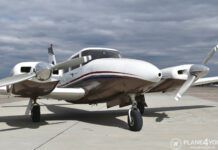Remember back in 2002 when the faddish phrase of the day in aviation was “disruptive technology?” It was being flogged mercilessly by Vern Raburn, who was then launching the Eclipse on a river of hype that spectacularly ended in the muddy flats of bankruptcy. The notion of disruptive technology-which is really just a techno-babble word for progress-was that some revolutionary products are so awesome that they completely rewrite the basic rules of the game. Digital cameras disrupted film; the internet disrupted the postal service.Didn’t happen with the Eclipse, but that’s not to say it’s not happening in aviation. And it’s not without its downsides, either. Two trends are approaching disruptive levels of progress: One is tablet computers, the other ADS-B. Related trends appear to be accelerating these shifts.Some years ago, when companies were writing aviation programs for the early PDAs such as Compaq’s iPaq and the Palm devices, some predicted that these would disrupt the portable GPS business. They didn’t. Those products were just too slow, too clumsy and too compromised to ignite much demand. The iPad changed that because Apple was-and is-famously competent not at generating original ideas, but in executing existing ideas more creatively.As a result, the dedicated aviation portable GPS market is disrupted. Garmin has basically owned it for more than a decade, but with so many tablet apps out there-including some from Garmin-it’s hard to imagine a new dedicated GPS portable emerging. At the very least, they won’t appear on the same short product cycles they once enjoyed. That’s progress, but it’s also a knife that cuts both ways.For as capable as the best apps are, I still don’t swoon over the hardware. I love my iPad mini, but hate the high-glare screen and its inherent flimsy feel. Although we now consider them laughably overpriced, dedicated portables are at least robust and durable and rarely would one just up and quit, as many apps routinely do. I doubt if I’d buy another portable, given the price against tablets and apps and the overall utility and value of the underlying platform. They’re just a slam dunk, but for me, there’s something to be lost, too. And the app market is just now entering its white-hot phase of competition. Wait’ll you see what comes out this week. Wait till Garmin decides to get into the portable AHRS business. It’s not for nothing that Garmin this month announced an aggressive move into sophisticated avionics for experimentals. Other companies are doing the same, representing what amounts to a shadow system of capable, uncertified avionics.As for ADS-B, I’ve been using the portable boxes that tap the ground network and although they perform well, the weather products are somewhat underwhelming. But the price is right. Free always works for me and I’m sure it will for many others, too. Then what of XMWX Weather? Will ADS-B chew into its business just enough to make it unviable? I’m hoping not, because XM’s weather products are considerably better than anything on ADS-B. The weather picture is simply painted with a richer palette. But I recognize some will accept an inferior product if they don’t have to pay for it and then just put up with any quality fade or loss of service. It is, after all, mission adequate. That’s the essence of competition and we should all be glad we have it, even if it disrupts products and services we like.The related trend I referred to above is what I sense is a rising rejection of the high price of staying in aviation and of the products and services it takes to do that. This sentiment has always been there, but with $6 avgas and the requirement to buy $2000 worth of data before the airplane even rolls a wheel, the number of people saying the hell with this is accelerating, in my view. Juxtaposed against a flood tide of inexpensive consumer-grade aviation gadgets, is this the set-up for a massive disruption of some sort? Are we on the verge of an aviation population about to revolt and demand lesser regulation to bring costs to more affordable levels? I got a sense of this from our tower survey in which hundreds of pilots wanted towers closed at the quietest airports because they see them as just another expensive intrusion of regulation that they don’t want being forced down their throats, with the alphabets aiding and abetting in the name of the holy spirit of safety.The odd thing is, as flying gets more economically inaccessible, the sale of apps almost suggests we’re selling ever more sophisticated gewgaws to lend ever more precision to that which we’re doing ever less of.If that’s a form of disruption, I’m not sure I want to know where it leads.
AVweb Insider
Publicity is the enemy of compacency and activists have sights on unleaded fuel.
Featured Video
Best Of The Web: Washington Flyby
About 60 GA aircraft representing GA over the past 85 years flew over downtown Washington on Saturday. It took more than an hour and...
































